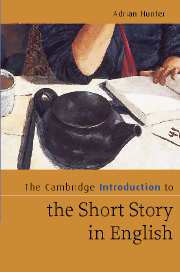Book contents
- Frontmatter
- Contents
- Acknowledgements
- Introduction
- Part I The nineteenth century
- Part II The modernist short story
- Part III Post-modernist stories
- Introduction: theories of form
- Chapter 8 Frank O'Connor and Sean O'Faolain
- Chapter 9 Elizabeth Bowen and V. S. Pritchett
- Chapter 10 Angela Carter and Ian McEwan
- Part IV Postcolonial and other stories
- Notes
- Guide to further reading
- Index
- Titles in this series:
Chapter 8 - Frank O'Connor and Sean O'Faolain
Published online by Cambridge University Press: 05 June 2012
- Frontmatter
- Contents
- Acknowledgements
- Introduction
- Part I The nineteenth century
- Part II The modernist short story
- Part III Post-modernist stories
- Introduction: theories of form
- Chapter 8 Frank O'Connor and Sean O'Faolain
- Chapter 9 Elizabeth Bowen and V. S. Pritchett
- Chapter 10 Angela Carter and Ian McEwan
- Part IV Postcolonial and other stories
- Notes
- Guide to further reading
- Index
- Titles in this series:
Summary
Like most of the writers in this section who came to prominence in the wake of international modernism, Sean O'Faolain distinguished himself not just as a practitioner of the short story form, but as a critic and theorist of it too. He published a full-length book on the subject, The Short Story (1948; revised 1972), as well as several essays and introductions in which he explored both the history of the form and the technical business of writing in it. O'Faolain was a peculiarly candid commentator on his own work, and at intervals in his long career revisited his earlier stories with a severely critical eye. For these reasons he is perhaps the writer best placed to help us to begin negotiating the development of the short story in the decades immediately after modernism.
That said, it is likely to strike any reader coming upon The Short Story how little O'Faolain appears to be taken with his modernist predecessors, most obviously James Joyce. Dubliners is acknowledged in the book, but briefly and grudgingly. While he admits that the early Joyce startled with the ‘innocence’ and deliberate ‘superficiality’ of his language, he goes on to complain that there is now, with hindsight, comparatively ‘little of this kind of pleasure’ to be had from Dubliners, and that the stories suffer badly from Joyce's overweening fondness for simile.
- Type
- Chapter
- Information
- The Cambridge Introduction to the Short Story in English , pp. 99 - 111Publisher: Cambridge University PressPrint publication year: 2007



